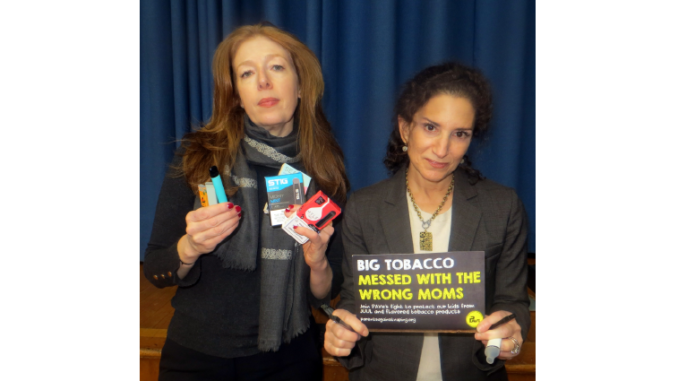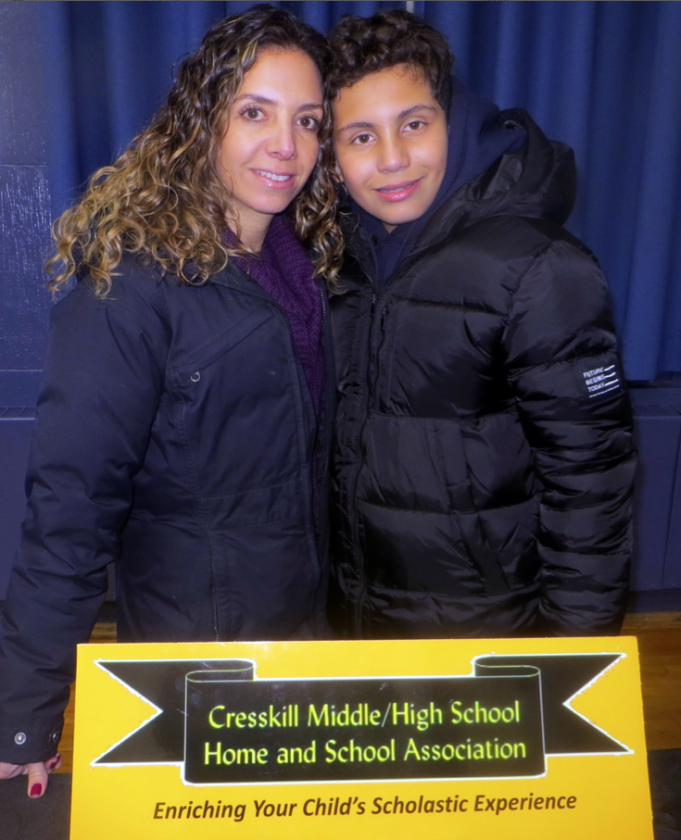
CRESSKILL, N.J.—As vaping related illnesses and deaths mount across the U.S., it is critical that parents effectively communicate with their children about the dangers of vaping.
On Dec. 4, the Cresskill Middle School/High School Home and School Association held a presentation at the Merritt Memorial School for parents to address that critical subject.
Dorian Fuhrman and Meredith Berkman, two of the co-founders of Parents Against Vaping e-cigarettes (PAVe), provided the information about vaping dangers and gave insight to help empower parents to discuss those dangers with their children to keep them from getting “fooled into JUUL.”
PAVe began in the spring of 2018, when three moms, Fuhrman, Berkman and Dina Alessi, joined forces as they realized that their teen sons and their friends were JUULing.
They began researching the topic and quickly realized that youth use of flavored cigarettes, and JUUL in particular, had reached what then-U.S. Food and Drug Administration Commissioner Dr. Scott Gottlieb and U.S Surgeon General Jerome Adams ultimately classified as an epidemic.
The three women, who had nine children aged 7 to 19 between them, founded Parents Against Vaping E-Cigarettes (PAVe) as a grassroots response to the most serious adolescent public health crisis our country has faced in decades.
Fuhrman recalls, “We founded our organization in 2018 after we discovered that JUUL had sent a representative into our kids ninth grade class to discuss addiction, saying JUUL was ‘totally safe’ but they did not want the kids as their customers. They totally lied!”
She continued, “We started our website shortly thereafter and began going into schools to educate parents and educators about the teen vaping epidemic, and the predatory practices of JUUL and its copycats.”
The PAVe founders have also been featured in major media such as The Wall Street Journal (Sept. 21, 2019).
The Dec. 4 Cresskill MS/HS Home and School Association presentation was attended by over 30 parents of teens and preteens, from Cresskill, and also from Alpine, Tenafly, Haworth and Dumont. They were joined by the Cresskill MS/HS Home School Association President Limor Kovar and PAVe Executive Director Roni Selig.
Amongst the group were Tenafly resident Liliana Aldeco and her 13-year-old son, Andres.
“My son started hearing about vaping and I saw the flyer about this presentation. As a parent, I feel it is my duty to let him know all the information that is out there,” Aldeco said.
Several other parents said they wished that they had brought their teens, too.
Fuhman and Berkman focused on the growth of teen vaping in America and what vaping entails: the products, the medical effects on the developing teen body (including disruptions to the brain, heart, lungs, kidneys and intestines) and behavioral issues associated with vaping and severe nicotine addiction.
Citing the Surgeon General’s warning in 2018 that vaping had reached epidemic proportions, they noted that at the time, the youth vaping numbers in America had hit 3.6 million kids who were vaping regularly.
“Today that number has climbed to 5.3 million kids. What was then an epidemic is now an emergency!” Dorian emphasized.
Berkman showed data from the 2019 National Youth Tobacco Survey that an estimated 27.5% of high school students and 40% of high school seniors as well as 10.5% of middle school students reported that they are vaping. Among current e-cigarette users, an estimated 59.1% of high school students and 54.1% of middle school students reported JUUL as their usual e-cigarette brand in the past 30 days. Among those using e-cigarettes, 72.2% of high school students and 59.2% of middle school students used flavored e-cigarettes, with fruit, menthol or mint, and candy, desserts, or other sweets being the most commonly reported flavors.
Berkman said that the problem of vaping in school is so widespread that some schools are removing the doors to bathroom stalls.
The speakers also related how JUUL was targeting kids where they lived, on social media, with aspirational lifestyle ads, and young influencers. Their device is stealth-by-design, blending in with the many computer parts that a parent might find on a teen’s desk. Even more alarming is the fact that the nicotine content of the fruity and minty pods contains more nicotine than that found in a pack of cigarettes.
“And it is not the cigarette nicotine of yesterday!” they said. “This nicotine is a highly concentrated, nicotine salt technology, delivering nicotine more efficiently to the brain and blood, giving the user an instant head rush and a need to replenish the nicotine levels often. Whereas E-cigarettes were originally designed to break nicotine addiction, they are more addictive than regular cigarettes!”
Berkman added, “Flavored JUULs are cleverly designed to mask the harsh taste you normally get in the back of your throat from a regular cigarette. They also alter the body’s PH balance so that you don’t even realize that you are inhaling a highly toxic substance. You only experience a pleasant, fruity taste.”
Eye opening information was also given about the huge number of “JUUL copycats” on the market selling JUUL compatible pods for JUUL and other devices and, a new teen favorite, disposable plastic and/or metal e-cigarettes which come in multiple fruit/candy/mint flavors, and pack more nicotine even than a JUUL. These counterfeit products as well as JUUL contain multiple toxic chemicals but none of them are regulated by the FDA.
The PAVe founders began to advocate for stricter laws and regulations when they realized that, although education was important, they could help slow this teen vaping epidemic by getting laws passed to ban the flavors which have been proven to hook kids. Since then, they have spoken in multiple city and state hearings, and have gone to Washington and spoken three times in Congress and twice at the FDA, with their sons as well. They continue to educate parents across the country.
PAVe’s volunteer advocates are operating in 16 chapters in 12 states and the organization is growing. These parent advocates work in partnership with other stakeholders and the broader anti-tobacco coalition.
The FDA has been lax in testing and regulating these products, which is not set to happen until May 2020, but Big Tobacco has been exerting tremendous pressure on the government to stall this. Activists want action taken immediately.
To address this, on Nov. 22, 2019, PAVe was at the White House as President Trump held a two-hour listening session on vaping with U.S. Health Secretary Alex Azar, senators, Kellyanne Conway (an Alpine resident), medical experts from the American Cancer Society and the Lung Association, and CEOs of the e-cigarette manufacturers. The PAVe founders put together and passed out a binder with hundreds of detailed and painful letters from teens and parents. No action has been taken yet but Furhman and Berkman are hopeful.
The focal point of the presentation was this statement: “We believe that regulatory and legislative change at the federal, state and local levels (including a ban on all e-cigarette flavors including mint and menthol and Tobacco 21 Laws without exceptions) are key to slowing the explosive growth of teen vaping and will prevent younger kids from starting to use flavored e-cigarettes, including JUUL.”

Is your child vaping?
Parents often don’t know that their child is vaping because it does not leave a telltale tobacco odor and the JUUL dispenser and pods are so small that kids can find numerous places to hide them in plain sight.
So, as they concluded their presentation, Fuhrman and Berkman gave a list of ways in which parents could tell if their child was vaping, including: explosive anger and mood swings; lack of impulse control; heightened sensitivity to caffeine; weight loss and upset stomach; changes in sleep patterns and restlessness; dry raspy cough; and frequent trips to the bathroom.
A final segment of the presentation explained how parents should talk to their children and advocate about vaping:
• Avoid direct confrontation. Instead of asking, “Are you vaping?” say, “I’ve been hearing about all the deaths and illnesses related to e-cigarettes. I’m really concerned. Have you heard anything about this?”
• Don’t exaggerate. If you tell your child they’re going to die, they tend not to believe you.
• Stay informed and educate yourself about the issues and risks of vaping.
A good site to visit for this is https://incorruptible.us.
• Talk to other parents, educators and healthcare providers.
• Write and speak to your elected officials demanding flavored and menthol e-cigarettes be banned. “Everyone has a voice. Use your voice!”
“Most importantly,” they advised, “become an advocate. Just by being here tonight, you are taking a step towards advocacy!”
